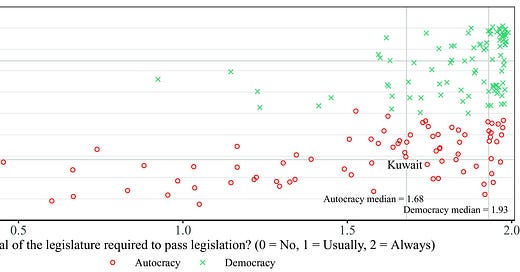Welcome back to This Week in Social Science. Authoritarian regimes often maintain elected legislatures to boost legitimacy—even Augustus Caesar kept the Roman Senate around—but how do they keep that legislature in check? This edition investigates the tools used by autocrats to co-opt and control elected legislatures.
Strategic corruption gives the government leverage over legislators in Russia
A new article examines how the Russian government controls their legislature by allowing corruption. The author constructed a dataset of corruption among Russian legislators by cross-referencing legislators’ formal financial disclosures with a registry of luxury car ownership. They find that 24% of legislators have obvious undisclosed income or assets—for example, these legislators drive cars worth more than their entire family’s annual income! Analyzing legislative voting records, the author finds that corrupt legislators are much more likely to vote with the ruling party, especially when that legislator is from an opposition party. Obvious corruption makes them easy targets for regime-controlled law enforcement, but the ruling party overlooks corruption when legislators behave politically. This research demonstrates how autocrats permit and monitor corruption to co-opt opposition legislators willing to trade cash for loyalty.1
Corruption and Compromise Co-opt Legislators in Kuwait
Another new paper tackles a similar question using data from Kuwait. The authors assembled a dataset of every vote in the Kuwaiti Legislature from 1963-2016 and identified when legislators voted with or against the monarchy. They found that the regime induces legislative compliance through two strategies. First, they buy votes with oil revenue. But second, the regime grants selective policy concessions. When an ideological group garners support in legislative elections, members of that group are given roles drafting legislation. In return, that group increases their support for all regime policies. This research shows that even autocrats require some elite and public support, and look for ways to appease those groups and avoid resistance.2
TL;DR: Autocratic regimes preserve their power not just by silencing opposition, but by cutting deals with it.
Like you, we love discovering new insights from social science. If you ever see research we should cover, email us at twiss.weekly@gmail.com.
Szakonyi, D. (2025). Corruption and Co-Optation in Autocracy: Evidence from Russia. American Political Science Review, 119(1), 402-419.
Tavana, D. L., & York, E. (2025). Legislative Cooptation in Authoritarian Regimes: Policy Cooperation in the Kuwait National Assembly. British Journal of Political Science, 55, e72.





Co-opting is likely more stable and less expensive than relying exclusively on repression. Would love to see a similar analysis of the CCP in China. It seems to me that the various corruption investigations and trials are targeted at those who may disagree with the current regime direction and may be threats to the current party/government heads.